Sharing love, and affection with your pup is good. But sometimes, you might feel like your dog loves you a little too much. Especially when they jump on your lap and refuse to move. It’s common to have questions; Why does my dog sit on me? Are they trying to hug? Is it a sign of love, or a cry for help?
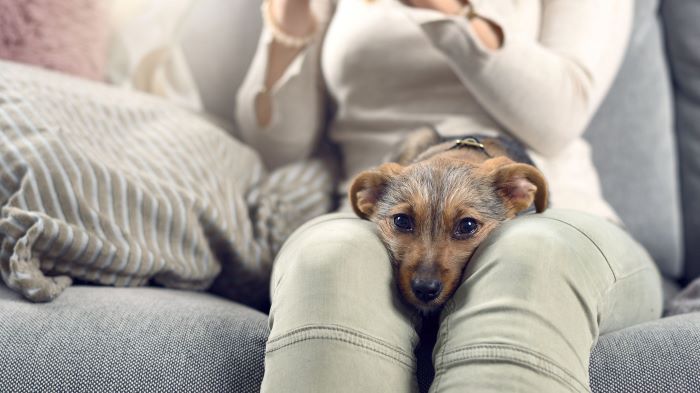
So, to help you out, we have done some great footwork, and came up with the possible reasons behind Why does your dog sit on you? In this blog post, we will reveal some of the secrets behind this common canine behavior, and what you can do about it.
Whether you want to cuddle with your furry friend or teach them some manners, we have some advice for you. Don’t miss this article!
Contents
Reasons Why Do Dog Sit on Your Lap
Dogs are social animals that crave human attention and affection. They also have different personalities and preferences that influence their behavior. Here are some of the common reasons why dogs sit on your lap:
1. Sits on Your Lap to Comfort You:
Dogs are very empathetic and can sense your emotions. They may sit on your lap to cheer you up or make you feel better when you are sad, stressed, or unwell. They may also do this to show their gratitude or loyalty to you. Dogs can be very supportive and comforting when you need them the most.
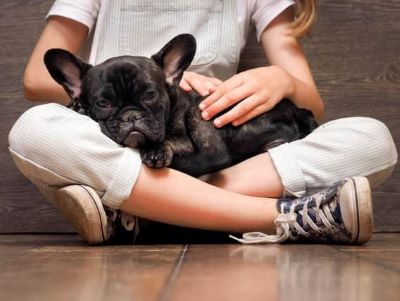
2. He Might be Showing Affection:
Dogs may sit on your lap to bond with you and show their affection. They may also do this to enjoy your company and attention. Cuddling with you can release oxytocin, a hormone that promotes social bonding and happiness in both dogs and humans.[1] Cuddling can also reduce stress and anxiety in both parties.
3. Dog Sit on Your Lap to Show Dominance:
Dogs may sit on your lap to mark their territory or to display their dominance over other dogs or people. They may do this to assert their position in the pack or to warn others to stay away from you. They may also do this to rub their scent on you, which is a way of claiming you as theirs.
4. Your Canine Feel Secure:
Dogs may sit on your lap to seek comfort or protection when they are afraid or uncomfortable. This may happen during thunderstorms, fireworks, vet visits, or other stressful situations. Your lap can be a safe haven for your dog, where he feels reassured and calmed by your presence and touch.
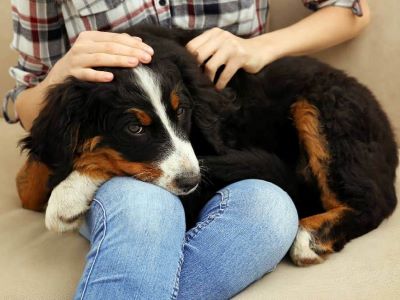
5. Just to Have a Better View:
Dogs could perch on your lap to observe what’s going on or to watch TV beside you. They could wish to participate in the fun out of curiosity or boredom. They may be able to see their environment more clearly and from a higher view point if they sit on your lap.
6. Dog Sit on Your Lap to Grab Your Attention:
In order to catch your attention or to request something like food, play, or petting dogs may sit on your lap. They could do this if they want to stop you from working on anything else or from taking a call. They can be looking for engagement or stimulation from you.
7. To Feel Warm:
Dogs may want for warmth on your lap, especially if they have short coats or are sensitive to the cold. They may feel comfortable and at ease thanks to your body heat. Whether it’s cold outside or during the winter, your lap may act as a natural heating pad for your dog.
Other Possible Reasons!
Besides the main reasons mentioned above, there are some other possible reasons why dogs sit on your lap, such as:
Breed Traits
Due to factors like size, temperament, or heritage, some dog breeds are more inclined than others to sit on your lap. For instance, due to their small size and love of cuddling, small breeds like Chihuahuas, Pugs, and Yorkies are sometimes referred to as lap dogs.
Large breeds like Mastiffs, Saint Bernards, and Great Danes, on the other hand, could also sit in your lap if they don’t recognize how huge they are or if they were bred to defend and protect their owners.
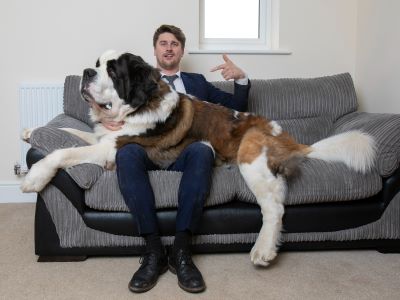
Reinforced Behavior
Dogs learn from their experiences and repeat behaviors that are rewarded or reinforced.
If you have encouraged or allowed your dog to sit on your lap in the past, he may continue to do so because he expects some positive outcome, such as praise, treats, or affection.
On the contrary, if you have discouraged or prevented your dog from sitting on your lap, he may stop doing so because he associates it with some negative consequence, such as scolding, pushing, or ignoring.
Separation Anxiety
Dogs may sit on your lap because they suffer from separation anxiety, which is a condition where they become anxious or distressed when separated from their owners or left alone.[2]
They may sit on your lap to prevent you from leaving or to cope with their fear of abandonment. They may also do this when you return home after being away, as a way of expressing their relief and joy of seeing you again.
Tips to Deal With This Behavior
If your dog sits on your lap too often or too forcefully, you might want to change this behavior. Here are some tips to deal with it in a positive and effective way.
- Enjoy the cuddling time with your dog and appreciate their love and loyalty.
- Set some boundaries and rules for when and where your dog can sit on your lap.
- Provide your dog with alternative places to rest, such as a bed, a blanket, or a crate.
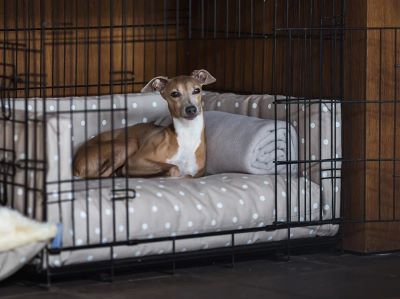
- Keep your dog warm and comfortable with appropriate clothing or heating pads.[3]
- Address any underlying issues that may cause your dog to sit on your lap excessively, such as fear, anxiety, boredom, or health problems.
- Consult a veterinarian or a trainer if your dog’s behavior becomes problematic or aggressive.
FAQs
What does it mean when my dog gets on my lap?
Your dog may have different motives for getting on your lap, depending on the situation and his personality, such as comfort, warmth, security, cuddling, attention, dominance or just sleep on you.
Why does my dog always want to sit on me?
He enjoys being close to you and feeling your warmth and touch. Sitting on you can also be a sign of separation anxiety, boredom. Your dog gets enough exercise, mental stimulation, and social interaction to prevent him from becoming too clingy or needy.
Why does my dog sit on my lap facing away?
Your dog may sit on your lap facing away because he feels comfortable and relaxed on your lap or he trusts you and doesn’t feel the need to watch you or his surroundings. It can also be a way for your dog to show his independence and confidence. He may also do this to get a better view of something behind you or to avoid eye contact with someone he doesn’t like.
Why does my dog sit on my lap and stare at me?
Your dog may sit on your lap and stare at you because he wants something from you, such as food, play, or petting. He may also do this because he loves you and wants to bond with you. Staring at you can also be a way for your dog to communicate his feelings and thoughts to you.
Conclusion
Understanding why dogs sit on your lap is essential for dog owners to nurture their bond and ensure their well-being. This behavior is influenced by factors such as personality, mood, environment, and the relationship between you and your furry friend.
Keeping your dog warm, comfortable, and addressing underlying issues are vital aspects of caring for their needs. Embracing these moments strengthens your connection, providing warmth, comfort, and deepening the bond between you.
By understanding and accommodating your dog’s needs, you create an environment of love, respect, and effective communication. Cherish the joy and companionship they bring to your life, celebrating the unconditional love your canine companion showers upon you.
We hope this blog post has helped you understand “Why Do Dogs Sit on Your Lap?” If you have any questions or comments, please feel free to leave them below. Thank you for reading!
References:
- Marshall-Pescini, S., Schaebs, F. S., Gaugg, A., Meinert, A., Deschner, T., & Range, F. (2019). The Role of Oxytocin in the Dog–Owner Relationship. Animals, 9(10), 792. https://doi.org/10.3390/ani9100792- NCBI
- Sargisson, R. J. (2014). Canine separation anxiety: strategies for treatment and management. Veterinary Medicine : Research and Reports, 143. https://doi.org/10.2147/vmrr.s60424- NCBI
- Animal Safety In Cold Weather | Orange County, NC. (n.d.). Retrieved June 7, 2023, from https://www.orangecountync.gov/3015/Animal-Safety-In-Cold-Weather- OCNC

Dania is a dog groomer living in California, who loves styling dogs. She often uses dog accessories to keep them distracted while grooming. She is also a dog parent to a Pomeranian, Duke. It’s because of him she is always on a lookout for the best dog foods, toys, other dog accessories, and ways to keep him equipped, healthy and happy.

